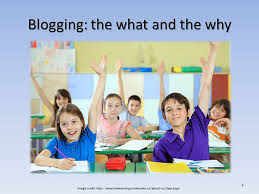Reading Blogs
Blogging is today's newspaper, book, magazine, and thinking pad all rolled into one. The beauty of a blog is that it provides the creator with a true freedom of expression. It allows us to create freely and express ourselves in ways that weren't available 20 years ago.
Blogging is today's newspaper, book, magazine, and thinking pad all rolled into one. The beauty of a blog is that it provides the creator with a true freedom of expression. It allows us to create freely and express ourselves in ways that weren't available 20 years ago.
This form of expression is ripe for the classroom:
- Many teachers at all levels use blogs to provide a painting easel for students to create.
- Some teachers use them to share information about what is happening in their classrooms (a much more direct form of communication than sending newsletters home each week.
- Many teachers use blogs to share their projects or ask advice of other educators. The opportunities are endless.
Here are some examples:
Student Creations
Sharing What's Happening in the Classroom
Sharing Ideas with Other Educators
- Cool Cat Teacher - High school business teacher. The most widely read educator blog in the world.
- Sunny Days in Second Grade
Following Blogs
Once you have found the blogs you want to follow, you need to find a way to get to them easily. Yes, you could bookmark them in your browser and then click on them daily. BUT, there IS a simpler way.
It is possible to use a Feed Reader to check your blogs daily and inform you when something new has been added. There are many of these feed readers, but to make it simple, I am going to suggest using Feedly.
Here is a short video on how to install Feedly as a Chrome Extension.


